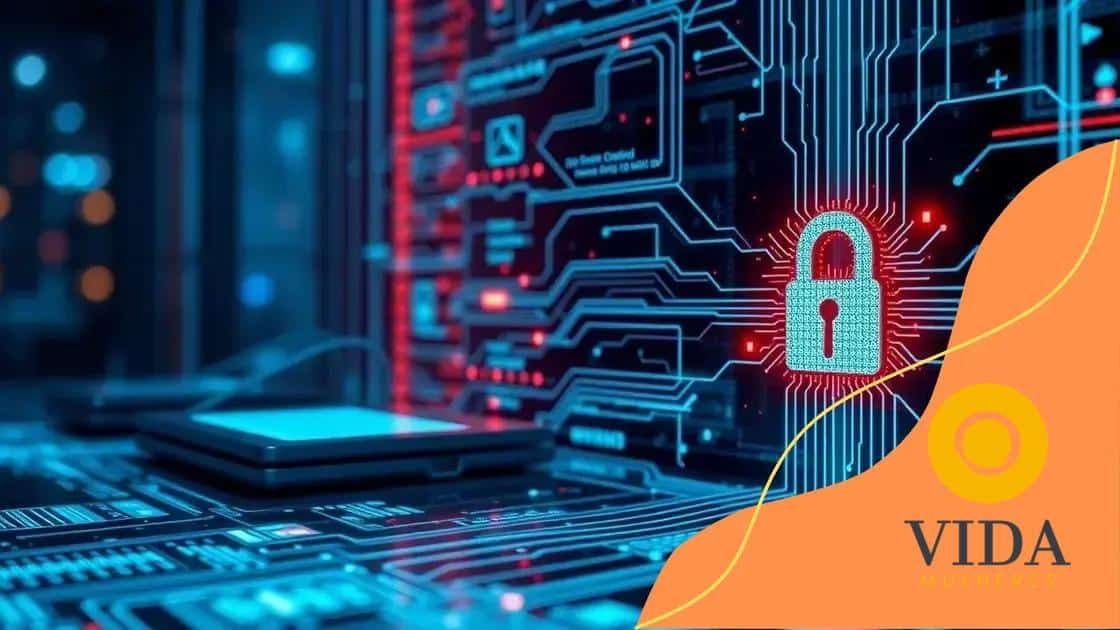Quantum encryption tested by global intelligence agencies

Quantum encryption is a secure method utilizing quantum mechanics to protect data, fundamentally altering communication security by ensuring that any interception alerts the intended users.
Quantum encryption tested by global intelligence agencies shines a light on an evolving field crucial for secure communications.
Have you ever wondered how it might change our digital landscape? Let’s dive into the details.
What is quantum encryption?
Quantum encryption is a method of securing data that leverages the principles of quantum mechanics.
It enables two parties to exchange information in a way that is inherently secure against eavesdropping.
How does this work? Let’s explore the fascinating world of quantum encryption.
How Quantum Encryption Works
This technology uses the behavior of quantum bits, or qubits, which can exist in multiple states at once.
When data is transmitted using qubits, any attempt to intercept the communication would alter the state of the qubits, alerting the intended recipients that a breach occurred.
This is a vital distinction from traditional encryption methods, which rely on mathematical algorithms that can potentially be cracked.
Key Principles of Quantum Encryption
Here are some key principles that underpin quantum encryption:
- Superposition: Qubits can represent both 0 and 1 at the same time.
- Entanglement: Qubits can be correlated in such a way that the state of one instantly influences another, no matter the distance.
- Measurement Impact: Observing a qubit changes its state, making eavesdropping detectable.
The significance of these principles cannot be overstated. They provide a foundation for creating communication channels that are secure from all forms of interception.
As technology evolves, many industries are looking to quantum encryption as a solution for safeguarding sensitive data.
Applications of Quantum Encryption
Many organizations are already exploring applications for quantum encryption. Some notable areas include:
- Financial transactions: Protecting sensitive financial data during transfer.
- Healthcare communications: Ensuring patient privacy in medical records.
- Government communications: Securing sensitive information for national security.
As we continue to develop this technology, the potential for increased security is immense.
The future of communications might very well depend on the principles of quantum mechanics.
Applications of quantum encryption in intelligence

Applications of quantum encryption in intelligence are critical for enhancing security across various sectors.
As governments and organizations seek to protect their sensitive communications, they are turning to innovative methods like quantum encryption.
Enhanced Communication Security
This technology provides unparalleled security for intelligence agencies by ensuring that any intercepted data becomes useless.
With quantum encryption, the mere act of eavesdropping on a communication alters the information being transmitted.
This ability makes it nearly impossible for unauthorized entities to gain access.
Field Deployment in Intelligence Operations
Many intelligence operations are implementing quantum encryption to safeguard their data. Some notable fields of application include:
- Military communications that require high levels of confidentiality.
- Diplomatic communications that protect sensitive negotiations.
- Surveillance data that must be secured against potential threats.
By using quantum encryption, organizations can ensure that critical information remains private, thereby maintaining national security.
Additionally, intelligence agencies are partnering with tech companies to develop robust quantum networks.
These advances allow for real-time encryption of data, enhancing operational readiness. With such secure channels, spies and intelligence operatives can share crucial information with confidence.
Future Implications
The implications of this technology are vast. As quantum encryption continues to evolve, it may redefine how intelligence is gathered and shared.
By staying ahead of potential cyber threats, nations can fortify their security protocols and make informed decisions.
How agencies are testing quantum encryption
How agencies are testing quantum encryption is an important aspect of integrating this technology into secure communications.
Many organizations are currently participating in trials to evaluate its effectiveness and reliability.
Experimental Frameworks for Testing
Agencies are using various experimental frameworks to evaluate quantum encryption. These frameworks often involve:
- Simulating real-world scenarios where data breaches could occur.
- Using quantum communication channels to assess the impact of eavesdropping.
- Engaging in collaborative trials with tech companies to refine algorithms.
Each of these methods helps to establish benchmarks and identify potential vulnerabilities in the system.
Collaboration with Research Institutions
Collaboration is another critical method for testing. Agencies are partnering with research institutions and universities that specialize in quantum mechanics. This collaboration allows for:
- Access to cutting-edge research and resources.
- Implementation of advanced quantum protocols in a controlled environment.
- Development of innovative technologies to enhance security measures.
Such partnerships provide valuable insights that guide future advancements in quantum encryption.
Field Tests and Real-World Applications
Field tests are essential for understanding how quantum encryption performs under real-world conditions. Agencies deploy this technology in:
- Secure communication systems for military operations.
- Data transfer processes in sensitive governmental exchanges.
- International collaborations for secure diplomatic communications.
By conducting these tests, agencies gain practical experience and gather data to improve the technology further.
Challenges faced in implementing quantum encryption
Challenges faced in implementing quantum encryption are crucial to understand as this technology evolves.
While promising, several obstacles still hinder its widespread use.
Technology Limitations
One major challenge is the current limitations of quantum encryption technology itself.
It relies on sophisticated hardware that can be expensive and complex to maintain. Many organizations struggle with:
- The need for specialized equipment to generate and detect qubits.
- Challenges related to the distance over which quantum signals can be reliably transmitted.
- Energy consumption issues associated with running quantum networks.
These limitations can slow down the adoption of this innovative solution.
Integration with Existing Systems
Another challenge involves integrating quantum encryption into existing cybersecurity frameworks. Organizations often face hurdles such as:
- Compatibility issues with current encryption technologies.
- Need for training staff to operate and manage new systems.
- The high cost of upgrading infrastructure to support quantum technologies.
These factors can create resistance against fully embracing quantum solutions.
Regulatory and Legal Concerns
Legal and regulatory hurdles also pose significant challenges. The development and deployment of quantum encryption technologies is often impacted by:
- Lack of clear regulations regarding data protection and encryption.
- Concerns over jurisdiction for encrypted data transmitted across borders.
- The evolving nature of cybersecurity laws which might not keep pace with technology.
These legal complexities can create uncertainty and inhibit progress in implementing this cutting-edge encryption solution.
Future of quantum encryption and data security
Future of quantum encryption and data security looks promising as technology advances.
This innovative method is set to redefine how we protect sensitive information.
Advancements in Quantum Technology
As quantum technology develops, the applications for quantum encryption will expand.
Researchers are working on making quantum systems more accessible and less expensive. In the near future, we may see:
- Improved quantum algorithms that enhance communication security.
- More efficient qubit generation methods for better transmission.
- Wider availability of quantum-secured networks for public and private uses.
These advancements will greatly impact how organizations secure their data.
Integration with Current Security Measures
Another important aspect of the future involves integrating quantum encryption with existing security measures.
Organizations will likely adopt a hybrid approach that includes:
- Combining quantum encryption with classical methods to strengthen overall security.
- Developing transition plans for businesses to adopt quantum solutions.
- Training personnel to effectively manage and implement these technologies.
This integration will help bridge the gap between current systems and future technologies.
Impact on Cybersecurity Landscape
As quantum encryption becomes more mainstream, its impact on the cybersecurity landscape will be significant. It may lead to:
- A comprehensive shift in how data is protected worldwide.
- New regulations focused on quantum technology and data security.
- Enhanced collaboration between governments and tech companies to create secure systems.
These changes will ultimately lead to stronger defenses against cyber threats.
FAQ – Frequently Asked Questions about Quantum Encryption
What is quantum encryption and how does it work?
Quantum encryption is a security method that uses quantum mechanics to secure data. It ensures that any interception of data changes the information, alerting the intended recipients.
What are the benefits of using quantum encryption?
Quantum encryption offers enhanced security for sensitive data, making it nearly impossible for unauthorized users to access or intercept communications.
What challenges does quantum encryption face?
Challenges include technological limitations, integration with existing systems, and regulatory concerns that can hinder widespread adoption.
How will quantum encryption impact the future of cybersecurity?
Quantum encryption is expected to strengthen data protection, lead to new regulations, and create safer communication methods against cyber threats.






